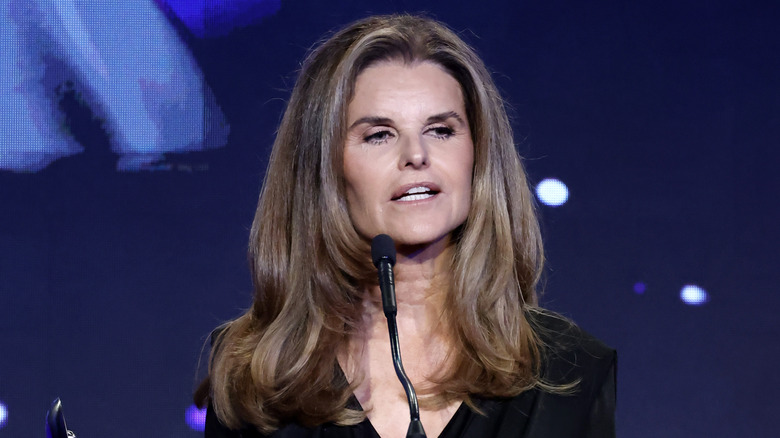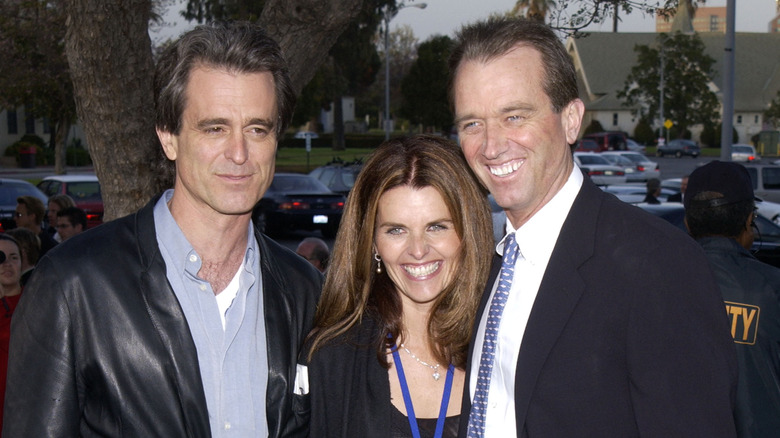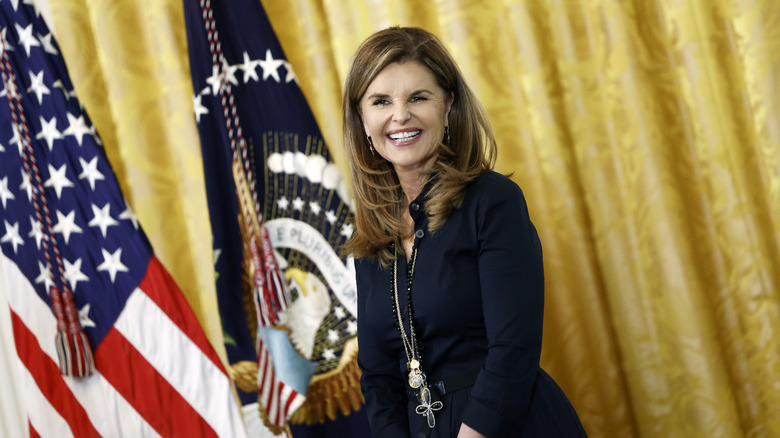Why Maria Shriver Deviated From Kennedy Family Norms And Became An Independent
The Kennedy family name has been publicly synonymous with the Democratic party for decades, and former first lady of California Maria Shriver has historically aligned her own political views with that of her relatives. However, she has officially decided to march to the beat of a different drum. In 2018, Shriver told Jennifer Granholm of the Commonwealth Club World Affairs of California, "I changed my registration after being First Lady to a 'decline to state,' and I'm an Independent."
Despite her early connections to the Democratic party, Shriver had plenty of experience collaborating across party lines before registering as an independent. When her then-husband, Arnold Schwarzenegger, ran for governor of California as a Republican, she supported him instead of being strictly loyal to the Kennedy family's party of choice. As she told Vanity Fair in 2011, "People say to me, 'I can't vote for a Republican,' but I say, 'Why not?' People get so caught up with labels.'"
Seeing the positives in political opponents wasn't necessarily an innate skill for Shriver, however. As she further explained to Granholm, "I was raised to think Republicans were the enemy," which is no surprise given her roots. As John F. Kennedy's niece, Shriver was undoubtedly exposed to the world of politics early in life and was likely influenced by the family's political leanings in her youth. However, she has clearly evolved beyond the viewpoints she was raised with and chosen a different path.
Maria Shriver isn't a traditional Kennedy
John F. Kennedy's 1960 presidential run was a huge political boost for his family, but he was far from the first Kennedy to enter politics. As detailed by PBS' "American Experience," JFK's grandfather, John F. Fitzgerald, served in the Massachusetts state legislature starting in 1892. His other grandfather, Patrick Joseph Kennedy, also had political ambitions, as did his father, Joe Kennedy.
Each subsequent generation of the Kennedy family has taken up the Democratic political banner, either through holding office themselves or working for their party in another capacity. In this way, Maria Shriver is definitely not a "typical" Kennedy. She pursued a career in journalism instead of running for public office and found success at NBC News, even taking part in a Peabody Award-winning special. In her 1998 acceptance speech, she facetiously expressed being relieved that "someone other than my family thought my work was great."
Although she wasn't as active in politics as some of her cousins, Shriver was never far from that world. According to an NBC News profile of Shriver, she took on the role of correspondent at the 1992, 1996, and 2000 political conventions, providing coverage for both parties. Viewing politics as an impartial outsider instead of a candidate may have helped shape her eventual choice to leave the party of her forefathers behind.
Being an independent helps Maria Shriver build connections
Maria Shriver's influence was integral when Arnold Schwarzenegger ran for governor, especially her commitment to the idea that he could unite people from both parties. Connie Bruck of The New Yorker said Shriver's vision of Schwarzenegger "was free of the stultified perspectives of more traditional Democrats and Republicans, and could meld elements of the left, right, and center in a fresh way that would resonate with most Americans." With Shriver's help, Schwarzenegger won the governorship in 2003 and served two full terms.
Shriver has since become even more focused on fostering unity than remaining loyal to her famous family's political party of choice. Shriver explained her continually evolving political stance to Extra's Billy Bush, highlighting how her experiences as first lady of California helped shape her views. In the interview, Shriver said, "I saw good people on both sides, and I felt that by becoming an Independent it was just easier to have conversations with people [at] both ends of the spectrum." This viewpoint may not align with the staunch Democratic views of Kennedys past, but it demonstrates Shriver's desire to reduce division and leave her own mark on the political world her family has helped shape.


